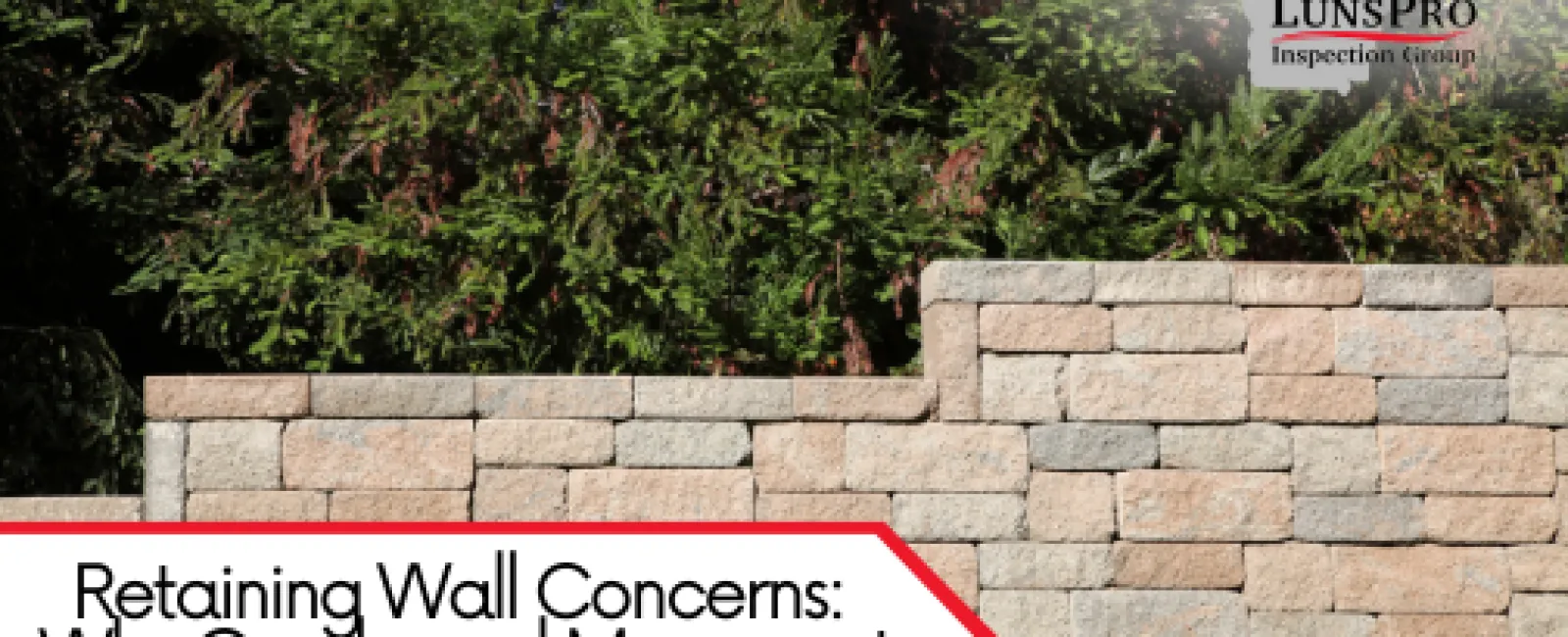Retaining walls often blend into the landscape, quietly holding back soil, supporting driveways, or shaping outdoor spaces. Many homeowners don't think twice about them—until cracks or shifting become visible. But a retaining wall isn't just an aesthetic feature. It's a critical structural element that, when compromised, can pose safety hazards and threaten the stability of surrounding property.
During a recent inspection, Certified Inspector Mike S. identified a retaining wall with visible cracks, displacement, and signs of movement. While these issues may appear cosmetic at first glance, they point to deeper structural concerns that require immediate attention. At LunsPro Inspection Group, we take retaining wall evaluations seriously. For property owners in Atlanta, Alpharetta, and Athens, our Residential and Commercial Inspections ensure these often-overlooked structures are assessed for safety and stability.
The Purpose of Retaining Walls
Retaining walls are designed to hold back soil and manage elevation changes in a landscape. They are especially common in Georgia, where sloped lots and clay-heavy soils create pressure that requires engineered solutions.
Functions of retaining walls include:
-
Supporting driveways, patios, and walkways.
-
Preventing soil erosion in sloped yards.
-
Protecting foundations from shifting soil.
-
Enhancing landscape design by creating terraces or level areas.
Because they carry heavy loads and resist constant lateral pressure, retaining walls must be constructed and maintained properly.
Signs of Retaining Wall Failure
Not all cracks or shifts are immediately catastrophic, but they're always a sign that the wall is under stress.
Common warning signs include:
-
Cracks in the Wall: Vertical or horizontal cracks that widen over time.
-
Bulging or Leaning: A wall bowing outward under soil pressure.
-
Displacement: Sections of the wall shifting or separating.
-
Soil Erosion: Washouts forming behind or beneath the wall.
-
Pooling Water: Drainage issues that increase pressure on the structure.
Inspectors at LunsPro Inspection Group look for these red flags during Georgia home inspections, documenting them carefully so homeowners can address issues promptly.
Causes of Retaining Wall Problems
Retaining walls fail for many reasons, often linked to design, installation, or maintenance errors.
The most common causes include:
-
Poor Drainage: Without proper drainage, water builds up behind the wall, creating hydrostatic pressure.
-
Improper Construction: Inadequate reinforcement, materials, or foundations make walls prone to failure.
-
Soil Conditions: Georgia's clay-rich soils expand when wet and shrink when dry, stressing walls.
-
Tree Roots: Expanding roots push against walls, causing cracks and displacement.
-
Lack of Maintenance: Ignoring small cracks or drainage issues accelerates deterioration.
By identifying the root cause, homeowners can choose the right repair or replacement solution.
Risks of Ignoring Retaining Wall Concerns
A retaining wall that's showing signs of stress should never be ignored.
Potential risks include:
-
Property Damage: Collapsed walls can damage driveways, patios, or landscaping.
-
Foundation Problems: Failed walls near homes may destabilize foundations.
-
Soil Erosion: Without support, soil can wash away, creating sinkholes or uneven ground.
-
Safety Hazards: A falling wall poses danger to people, vehicles, and nearby structures.
-
Decreased Property Value: Buyers are wary of properties with visible structural problems.
During Atlanta, Alpharetta, and Athens Residential and Commercial Inspections, our inspectors document these risks so homeowners understand the urgency of addressing retaining wall issues.
How Inspectors Evaluate Retaining Walls
At LunsPro Inspection Group, we follow a systematic process to evaluate retaining walls during inspections.
Our evaluation includes:
-
Checking for cracks, displacement, and bulging.
-
Assessing drainage systems behind the wall.
-
Evaluating soil conditions around the structure.
-
Documenting signs of erosion or water pooling.
-
Determining whether the wall meets modern construction standards.
While inspectors don't perform engineering calculations, we identify conditions that require further evaluation by qualified contractors or engineers.
Repair Options for Retaining Walls
When retaining walls show signs of damage, repair strategies depend on severity.
Possible solutions include:
-
Drainage Improvements: Installing weep holes, French drains, or gravel backfill to reduce pressure.
-
Reinforcement: Adding anchors, tiebacks, or retaining plates to stabilize walls.
-
Partial Rebuilds: Replacing damaged sections with stronger materials.
-
Complete Replacement: For severely failed walls, a full rebuild may be necessary.
Proactive repairs are always less expensive than waiting for total wall collapse.
Retaining Walls in Commercial Properties
Commercial properties often rely on large retaining walls to support parking lots, landscaping, or building perimeters. Failure in these walls poses greater risks due to higher foot traffic and heavier loads.
In commercial inspections, we often find:
-
Walls bowing under the weight of parking areas.
-
Inadequate drainage causing cracks and movement.
-
Poor construction practices in older properties.
For business owners in Atlanta, Alpharetta, and Athens, Commercial Inspections from LunsPro Inspection Group ensure these structures are safe and properly maintained.
Preventative Maintenance for Retaining Walls
Preventing wall failure starts with consistent maintenance.
Tips for homeowners include:
-
Inspect walls annually for cracks or leaning.
-
Ensure gutters and downspouts divert water away from walls.
-
Remove tree roots and vegetation pushing against walls.
-
Keep drainage systems behind walls clear and functional.
-
Address small repairs promptly before they worsen.
Paired with routine Georgia home inspections, these steps help extend the life of retaining walls.
Why Choose LunsPro Inspection Group
At LunsPro Inspection Group, we know that structural concerns like retaining wall movement can be overwhelming. Our inspectors are trained to recognize early signs of failure and document conditions clearly, giving homeowners actionable information.
With extensive experience in Atlanta, Alpharetta, and Athens Residential and Commercial Inspections, we provide detailed reports that highlight concerns and recommend when professional evaluation is necessary. Whether you're buying, selling, or maintaining a property, our Georgia home inspections deliver the clarity you need.
Protecting Your Property's Foundation and Safety
Retaining walls are more than just landscaping features—they are critical structures that protect your home, foundation, and yard from soil pressure and erosion. When cracks, leaning, or displacement appear, it's a sign that the wall is under stress and potentially failing. Ignoring these warnings can lead to costly repairs, safety risks, and reduced property value.
For homeowners and business owners in Atlanta, Alpharetta, and Athens, inspections from LunsPro Inspection Group ensure retaining walls are thoroughly evaluated for safety and stability. Our Residential and Commercial Inspections catch these problems early, giving you the chance to act before they escalate into emergencies.
Don't wait for a wall to collapse before taking action. Schedule your Georgia home inspection with LunsPro Inspection Group today, and protect your property from hidden structural risks.

